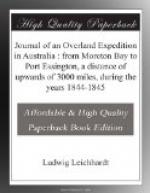March 20.—We travelled down to the water-holes, at which I had turned back. Sandstone rock cropped out on several spots, and pieces of broken quartz were strewed over the ground. All the water-holes along the low ridges and within the bed of the river, were full of water; and the district seemed to be one of those which, from their peculiar conformation of surface, are more frequently favoured by thunder-storms. Native companions flew down the river, and flights of ducks held their course in the same direction. With the hope of finding a good supply of water lower down, we continued our journey on the 21st March. The creek frequently divided into channels, forming large islands of a mile and a mile and a-half in length, covered with scrub, and over which freshes had swept. All at once, the water disappeared; the deepest holes were dry; the Melaleucas were not to be found; the flooded-gums became very rare, and the rich green grass was replaced by a scanty wiry grass. The whole river seemed to divide into chains of dry water-holes, scarcely connected by hollows. Two miles farther we came to a fine large water-hole, surrounded by Polygonums and young water-grass, and, at two miles farther, to another, and in about the same distance to a third. Recent camps of the natives were on each of them, and a beaten path led from one to the other. One of these holes was crossed by a weir made of sticks for catching fish. Bones of large fish, turtle shells, and heaps of muscles, were strewed round the fire places.
The whole day was bright and very hot; the wind in the afternoon from E.S.E. The latitude of our last camp was 21 degrees 31 minutes 16 seconds, being about eighteen miles W.N.W. from the lake.
Mr. Roper and Brown rode about seven miles down the river, and found that it again formed a large regular bed well supplied with water; and that the country was of a more open character. They came suddenly upon two women cooking mussels, who ran off, leaving their dinners to their unwelcome visitors, who quickly dispatched the agreeable repast; farther on they saw four men, who were too shy to approach. Charley also, whilst bringing in the horses on the morning of the 22nd, passed a numerous camp, who quietly rose and gazed at him, but did not utter a single word.
I travelled with my party to the water-holes found by Mr. Roper; on approaching them, we crossed an extensive box-flat, near that part of the river where it is split into collateral chains of holes. Talc-schiste cropped out at the latter part of the journey; its strata were perpendicular, and their direction from north-west to south-east; its character was the same as that of Moreton Bay and New England; numerous veins of quartz intersected the rock.
The water-holes were surrounded by high Polygonums; blue Nymphaeas were observed in several of them; and ducks were very numerous.
The forenoon was cloudless and hot; cirrhous clouds formed in the afternoon; with a breeze from the E.S.E. Our lat. was 21 degrees 25 minutes.




